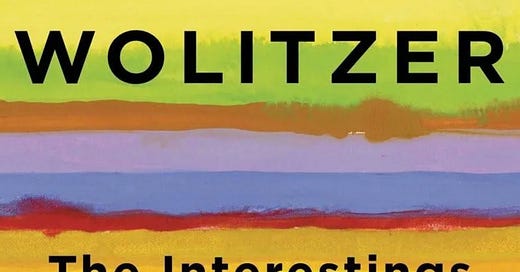#15: Make Elections Fun Again
Plus, "The Interestings" by Meg Wolitzer. Plus, one-thing shorter.
On November 5 this year I hosted a paint night for some friends. We made anxious axolotls, exuberant jellyfish, buggy-eyed monsters, line-art birthday cake. No one checked their phones. No news either. I went to bed knowing nothing. It was excellent.
The ethics of a tune-out-the-world paint night might be questionable to some. For my friends and me—queers, aliens, people with uteruses—making art is a coping strategy. An act of defiance. A form of play. It doesn’t matter if the art is “good,” whatever that means. Far more important is the release it offers. When I make art—any art—I go from being a bag of bones to a luminous spirit.
It’s not just what I paint, of course. It’s also what I write, cook, sing, think.
Perhaps you agree with me? Perhaps you already know how it feels. If not, and if you’re curious to know how it feels, try this exercise: take two unrelated things and try to connect them somehow—in words, graphics, whatever. The more absurd the connection, the better.
For instance: I recently had a hilarious, if problematic—not that word again!—dream. I don’t remember much except the hat I was wearing, which read, in big red letters, MAKE ELECTIONS FUN AGAIN. Waking that morning, I asked myself the following nonsensical question: If the elections were a type of food, what would they be?
My answer: The recently concluded Lok Sabha elections felt rather like a saffron laddoo, soaked in cow urine instead of sugar syrup, perhaps. As for the U.S. presidential election, I would say it’s a BLT on country bread, the bacon fried to a crisp, the lettuce harboring E. coli perhaps, the tomatoes glowing unnaturally red.
Book 15: "The Interestings" by Meg Wolitzer
In 2010, in the weeks before I left for the U.S., I watched two very memorable movies: “Mean Girls,” starring Lindsay Lohan, and the Michael Moore documentary “Sicko.” The first taught me it wasn’t enough to be good at math. The second taught me I should never, ever, ever get sick. I arrived in the U.S. spooked and vulnerable, devoid of nuance. If I could go back in time, I would forgo both movies and gift my past self this gorgeous, amazing, relentlessly readable book.
“The Interestings,” by Meg Wolitzer, follows the lives of five friends from high school into late middle age, through love and heartbreak, betrayal and illness. Like many great books, it feels anthropological in scope: a deep character study without easy indictments. Here are a few examples.
On the pluck of youth:
So it was decided. “From this day forward, because we are clearly the most interesting people who ever fucking lived,” said Ethan, “because we are just so fucking compelling, our brains swollen with intellectual thoughts, let us be known as the Interestings. And let everyone who meets us fall down dead in our path from just how fucking interesting we are.”
On sex through the ages:
Sex at twenty-two was idyllic. Sex at twenty-two wasn’t college sex at eighteen, which carried with it a freight of insecurities, nerve endings, and shame. Sex at twenty-two also wasn’t self-sex at twelve, which was just about being quiet and discrete in your narrow bed and thinking how strange it was that you could feel this way just by doing this. Sex at twenty-two wasn’t sex at fifty-two either, which, when it took place all those decades later, in the middle of the Jacobson-Boyds’ lengthy marriage, could be a sudden pleasing surprise that awakened one of them from sleep. But sex at twenty-two, well, that was really something, Jules thought, and Dennis apparently thought so, too. Both of their bodies were still perfect, or perfect enough; they would come to see this later on, though they couldn’t see it at the time. Self-conscious, dying with embarrassment, but so excited, they stripped to their skin for each other for the first time standing beside the loft bed in his apartment that day, and she made him go up the ladder first so he wouldn’t be able to watch her from behind—knowing that if he did, as she lifted a leg to reach the next rung the most private section of herself would have been briefly cleaved and displayed.
On counterculture wisdom:
“This will sound pretentious,” said Ethan. “But I want to not think about myself so much.” He looked at her for a reaction.
“I’m not sure what you’re saying.”
“I want to not think so much about what I want, and what I missed out on. I want to think about other things—other people, in other places even. I am so tired of all the little ironic in-jokes, and reciting lines from TV shows and movies and books. Everything from the . . . circumscribed world. I want an uncircumscribed world.”
“And an uncircumcised world,” Jules said, for no reason other than that it was the kind of thing they said to each other, calling it wit.
On the scourge of time:
Life took people and shook them around until finally they were unrecognizable even to those who had once known them well.
One-thing Shorter
Back to the election, the elephant in the room. (That’s a joke, get it?)
Of all the essays, op-eds, expert analyses, hot takes and so sorth, out of everything that’s been written about the most recent red wave, here is the thing that really hit home for me: “Five Thought Experiments Concerning the Underlying Disease” by George Saunders. (As always, let me know if you have trouble accessing it.)





![The Interestings: A Novel [Book] The Interestings: A Novel [Book]](https://substackcdn.com/image/fetch/$s_!VSJI!,w_1456,c_limit,f_auto,q_auto:good,fl_progressive:steep/https%3A%2F%2Fsubstack-post-media.s3.amazonaws.com%2Fpublic%2Fimages%2Feb228c62-cca9-4698-8af7-f4e2ddc1bdeb_769x1200.jpeg)
Elections! What can one say?